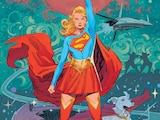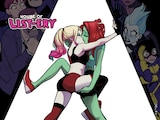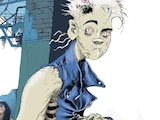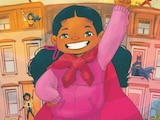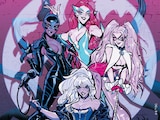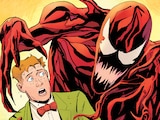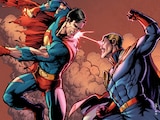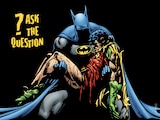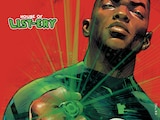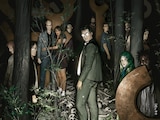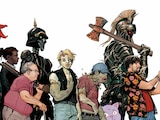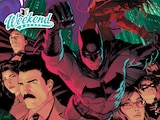When I think of Shazam, I think of family. I suppose that should be obvious since the Shazam team—or “Shazamily,” as they’ve become known—is made up of a literal family. The whole concept is a big part of the franchise as a whole and I’m looking forward to Shazam! Fury of the Gods exploring the idea of family further.
As we all wait for the movie’s release, I thought I’d go back and revisit 2019’s Shazam! (it’s streaming on HBO Max, if you were wondering). A lot has been said about the first film and its message of found family. Billy’s search for his birthmother, her rejection and his eventual acceptance of his foster family is at the heart of the movie. However, I couldn’t help thinking about his siblings. What kind of a journey did they have? Did they initially reject life as a foster kid the way Billy did? Did they embrace their found family, or was it a struggle?
Think about it, there are five other kids in that household, and each one probably has an interesting origin story. Have they dealt with the same parental rejection Billy did? Perhaps that’s why they are willing to look past his anti-social behavior. Once you come to this realization, it changes the way you watch the film.
With no canonical backstory to rely on, all I can do is speculate, but I’d imagine that Darla Dudley has a background similar to Billy’s. She clings to the idea of Billy being her brother within seconds of meeting him. This seems to be less about Billy, and more about Darla’s desire to have a family. We don’t know how she lost her biological family, but some of her reactions point to a rejection, similar to the one Billy went through during the third act of the film.
Look at the banner she made for Billy when he arrived at the foster home. It’s going overboard, but it’s also a classic sign of overcompensation. When the card accidentally rips, Darla looks like she’s about to have a breakdown. She feels like if everything isn’t perfect, then it’s a reflection on her, and she’ll lose her new family as well. Maybe Darla thinks her birth-family rejected her because she wasn’t “good enough.” This is a common way young children internalize losing their families. As a result, Darla does everything she can to be a good child.
She clings to the concept of family, holding onto them as tight as she could. The idea of Mary moving across the country for college is upsetting to her, probably because it’s forcing her to confront her feelings of rejection all over again. Maybe I’m way off-base, but all of this points to a sad backstory for Darla Dudley.
Speaking of Mary Bromfield, in many ways she seems like a grown-up version of Darla, and I don’t mean in a “say the magic word and transform into an adult superhero” way. Mary has thrown herself into her studies, desperately trying to be the perfect student. Like Darla, it’s possible this is Mary’s way of making sure she’s “good enough.” The thought of going away to college in another state is also upsetting to her, despite the fact that she shares a crowded home with five foster siblings. This speaks to what Mary’s found family truly means to her.
Interestingly, a conversation between the foster parents Rosa and Victor reveals that Mary ran away from the group home twice. It’s hard to imagine the polished Mary Bromfield we see in the movie doing this, which means she’s come a long way. Those early days sound like they were rough, but it seems like Mary was able to get through them thanks to her new family.
Eugene and Pedro are a bit harder to figure out because both boys seem introverted. Eugene has his face in electronics at all times, which could be a coping mechanism to disengage from the world. Or it could be that he’s a preteen boy. Seriously, if you’ve ever met a preteen boy, they’re addicted to screens. Eugene is quiet, which could mean he’s afraid of putting himself out there. Or he could be an introverted teenager. Honestly, these are some of the reasons why I want to explore these characters further. There is so much there waiting to be unpeeled.
Freddy is an interesting case as well. He seems to use humor as a defense mechanism, and he’s overly forgiving of Billy in the first act. He knows that Billy stole his Superman collectible bullet, but he’s still trying to be his best friend. What drives a boy to do something like that? Was it his own longing for a sense of family? Or perhaps he sensed what Billy needed? Maybe it was a little bit of both.
It’s interesting to see how the siblings interact with one another. I love the fact that they all walk to school together. I love that they all seem to watch television together and eat dinner together every night. Yes, they’re five siblings (six after Billy moves in) living in a crowded foster home together, but they seem to choose to spend time together and genuinely enjoy it.
It says a lot about what they value, and I’ll credit that with good parenting. Yes, we need to talk about Victor and Rosa, the two MVPs of the movie. This couple has chosen to take in six children, which is no easy feat. Not only that, but they seem pretty well adjusted. All of the kids seem to be thriving under Victor and Rosa’s care. It probably helps that Rosa and Victor were foster kids themselves, which gives them the ability to understand these kids and approach them in a nonjudgmental way.
What does all of this mean for Shazam! Fury of the Gods? That remains to be seen, but I’m looking forward to seeing the family together again. Shazam! isn’t just a found family story for Billy. It’s about Mary’s found family, and Darla’s, and Freddy’s. It’s about all of them. Now that they’ve found each other, it’s time to experience their next chapter. I know I’m ready, are you?
Shazam! Fury of the Gods, starring Zachary Levi and directed by David F. Sandberg, opens in theaters on March 17. Get ready by watching 2019’s Shazam!, now streaming on HBO Max.
Joshua Lapin-Bertone writes about TV, movies and comics for DC.com, is a regular contributor to the Couch Club and writes our monthly Batman column, "Gotham Gazette." Follow him on Twitter at @TBUJosh.
NOTE: The views and opinions expressed in this feature are solely those of Joshua Lapin-Bertone and do not necessarily reflect those of DC Entertainment or Warner Bros.



